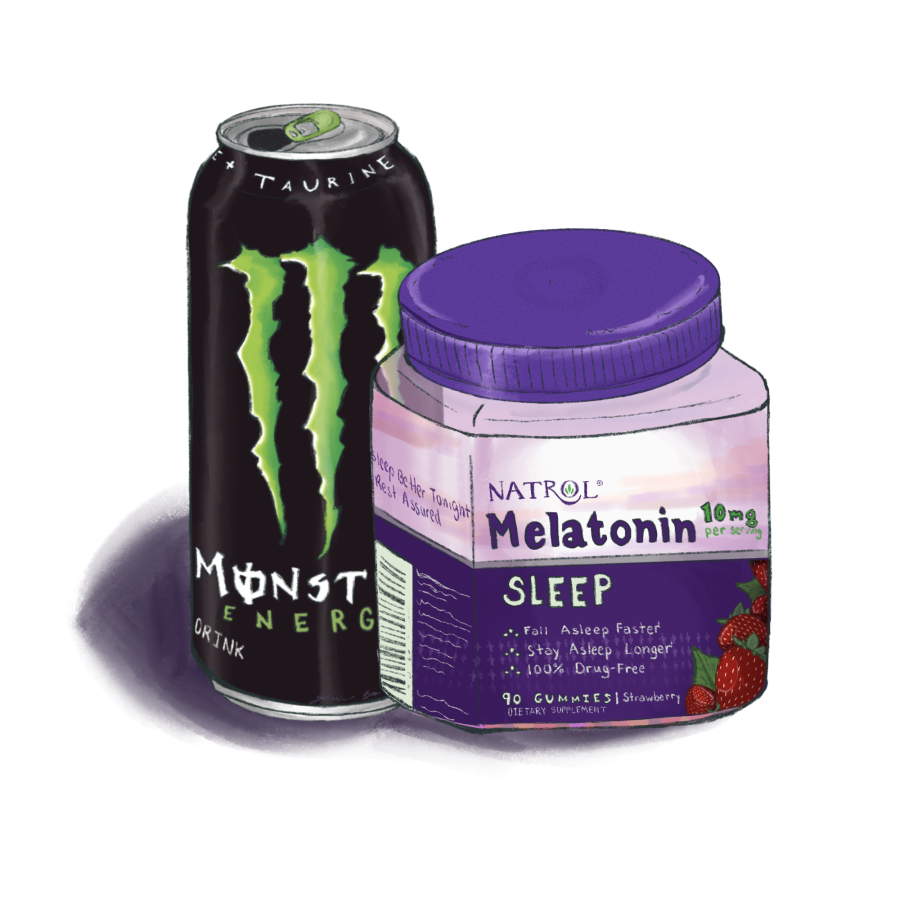Senior Annelise Balentine reaches for her plastic jar of melatonin gummies before climbing into bed. The clock reads 12:14 a.m., a couple hours earlier than when she usually goes to sleep. Balentine’s eyelids grow heavier by the minute, and she quickly falls asleep.
According to the CDC, the number of young people taking melatonin supplements increased 530 percent from 2012-2021. With the increasing number of students who use melatonin to try to fall asleep, psychology teacher Christopher Farina said people should also consider the supplements’ adverse effects on the biological clock.
Farina said peoples’ bodies already produce a natural level of melatonin to help them feel sleepy.
“It’s produced up in the brain, as opposed to other hormones which are produced throughout the whole body, so the structure that secretes it is particularly sensitive to light,” Farina said. “When there’s not as much light hitting your eyes, then your body will secrete more melatonin.”
Although many students may take melatonin supplements to help them go to sleep, Farina said there is no concrete evidence that it actually works.
“The research is pretty mixed on whether or not over-the-counter melatonin really works or not,” Farina said. “It seems like on average it probably doesn’t do much, but there could be a lot of individual variation within it. For some people it really can make a difference, and for others it really doesn’t make a big difference.”
For Balentine, taking melatonin supplements does help her fall asleep faster.
“I consume melatonin about once or twice a week, and its effects are helpful,” Balentine said. “I take it when I know I have to wake up early or just want to go to bed earlier because I usually go to bed at 1 or 2 a.m. with my normal sleep schedule.”
However, Farina said the effectiveness of over-the-counter melatonin may be the result of the belief that it works.
“It is also important to note that it could be the placebo effect, where taking it externally makes you feel like you’re doing something,” Farina said. “Then you have the expectation of feeling sleepier, which makes you more likely to fall asleep.”
While taking melatonin can be convenient, Farina said if someone is having trouble falling asleep, that could mean there are other factors melatonin-users should consider such as sleep hygiene.
“It’s fine if you use it every once in a while, like when you’re traveling to different time zones, then it can be helpful to get you on that circadian rhythm to reset your biological clock,” Farina said. “But if you are using it every night to get to sleep then there are probably other things you could be doing better.”
Student caffeine consumption can also contribute to sleep troubles. While young people may rely on coffee or energy drinks to avoid falling asleep in classes after a long night of homework or studying, Farina said caffeine works in the brain by keeping people feeling alert and awake.
“(Caffeine) is an adenosine antagonist, so it blocks neurotransmitters, which are what help you feel sleepy — it essentially prevents sleepiness,” Farina said. “If you can’t clear the caffeine from your system in time to go to bed, then it’s going to delay what’s called sleep onset, or how long it takes you to fall asleep.”
Although senior Aryan Jain said he consumes coffee four to five times a week, he has not noticed changes in his threshold for caffeine.
“Overall, I haven’t become tolerant to caffeine yet, so it’s really beneficial toward helping me stay awake, especially during tough school weeks when I need to stay up late studying,” Jain said. “I try to not have caffeine later than around 4-5 p.m. because I notice the effects lasting around six to eight hours for me, and it has impeded my ability to sleep before.”
Farina said variation in tolerance levels of caffeine can affect how much someone should consume.
“Some people are not sensitive to caffeine and can have a cup of coffee after dinner and be fine,” Farina said. “Other people might have a cup of coffee with lunch and will struggle to fall asleep even eight to ten hours later.”
Farina also said regardless of how much caffeine or melatonin people take, their biological clocks will not be permanently changed.
Farina said, “There’s nothing you can really do to permanently alter your circadian rhythm since it’s dependent on the sun, and that stays consistent.”

